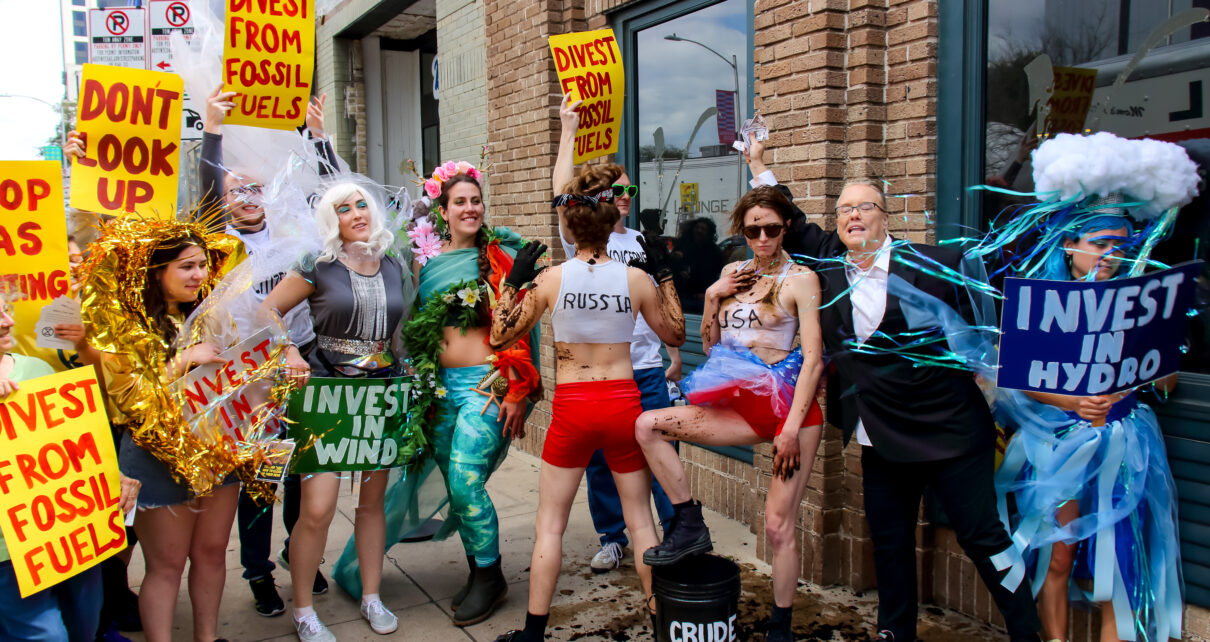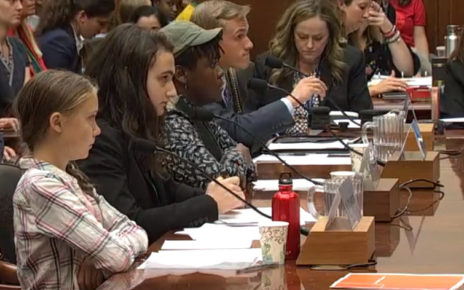A group of concerned citizens, artists and climate activists staged a performance art demonstration at the SXSW festival in Austin, Texas, on Monday, March 14th, while the U.S. Shell Corporation President Gretchen Watkins held a “Fireside chat” about Shell’s target to reach net-zero emissions by 2050. The demonstration was organized by members of Extinction Rebellion, the Sunrise Movement and the advocacy group Public Citizen. The group gathered outside the “Shell House” at Antone’s in downtown Austin to draw attention to the climate crisis, to call out Shell’s attempt to greenwash their image while still expanding fossil fuel production, and to give fellow citizens a chance to connect over the urgency of organizing around climate action.
The performance art featured two artists wearing tops labeled “Russia” and “USA,” both fighting over a bucket of fake oil and begging for more money from a third individual labeled “Big Oil,” who had a cigar, a drawn-on mustache and a bag full of cash. Meanwhile, four more artists in costumes representing Mother Earth, the Sun, Wind and Water stood by with signs urging investment in renewable energy sources.
Humor as Climate Action
The performance used humor to draw the attention of SXSW attendees who were passing by, with the artist portraying the USA shouting suggestively, “Who wants to drill me harder? I just want a good frack! I really need a good frack right about now.” As people passed by and stopped to watch, concerned citizens handed out flyers for the local Extinction Rebellion chapter containing a link to follow-up information and actions at https://alivein2050.com/
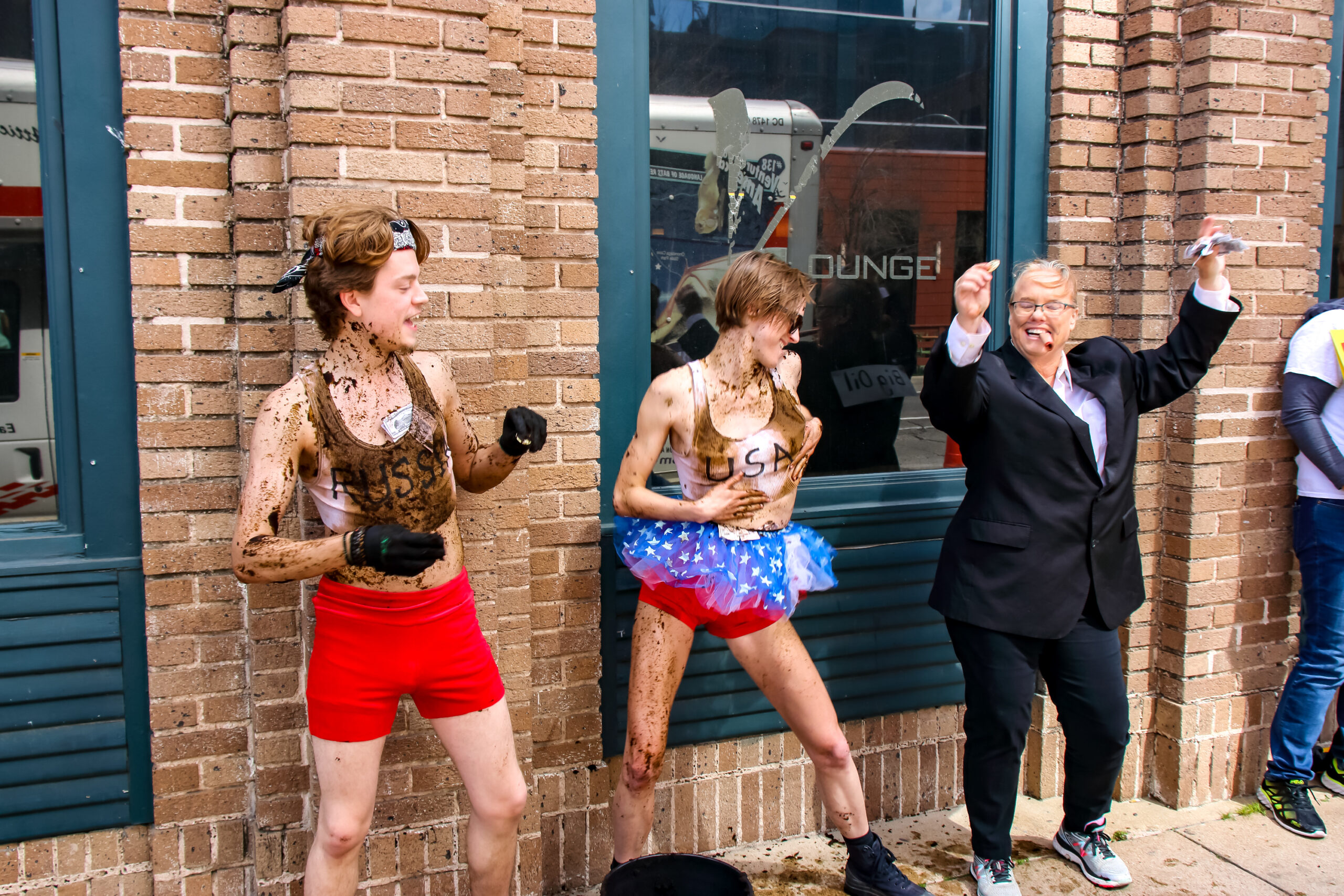
Because climate change can often feel tense and overwhelming to talk about, the use of humor is meant to make getting engaged less intimidating. “Creating experiences that are playful, funny, and draw people in can make really difficult topics more approachable and easier to talk about,” the artist portraying the USA told Branch Out.
The performance painted a visceral picture of corporate greed, with Mother Earth crying, “why are you doing this to me?” before getting chastised by Big Oil, Russia and the USA, who responded, “Mother Earth, shut the fuck up. You’re really bothering the orgy right now, ok?” Meanwhile, a concerned citizen holding a megaphone shouted up to the Shell House, “Today is the day! The people are here! Come outside!”
Mutual Aid vs. Greenwashing
One of the group’s organizers described the performance as more of a mutual aid event than a protest. They told Branch Out that their intention is to “connect people who are worried about climate change with community and resources to activate their networks because this is the only way that we will be able to achieve widespread change.”
The organizer was critical of Shell being at SXSW to advertise their commitment to a net-zero future: “Greenwashing campaigns are a subversive attempt to convince the average person that they are in fact responsible for climate change, and that by making better choices they can impact the planet and reverse climate change.”
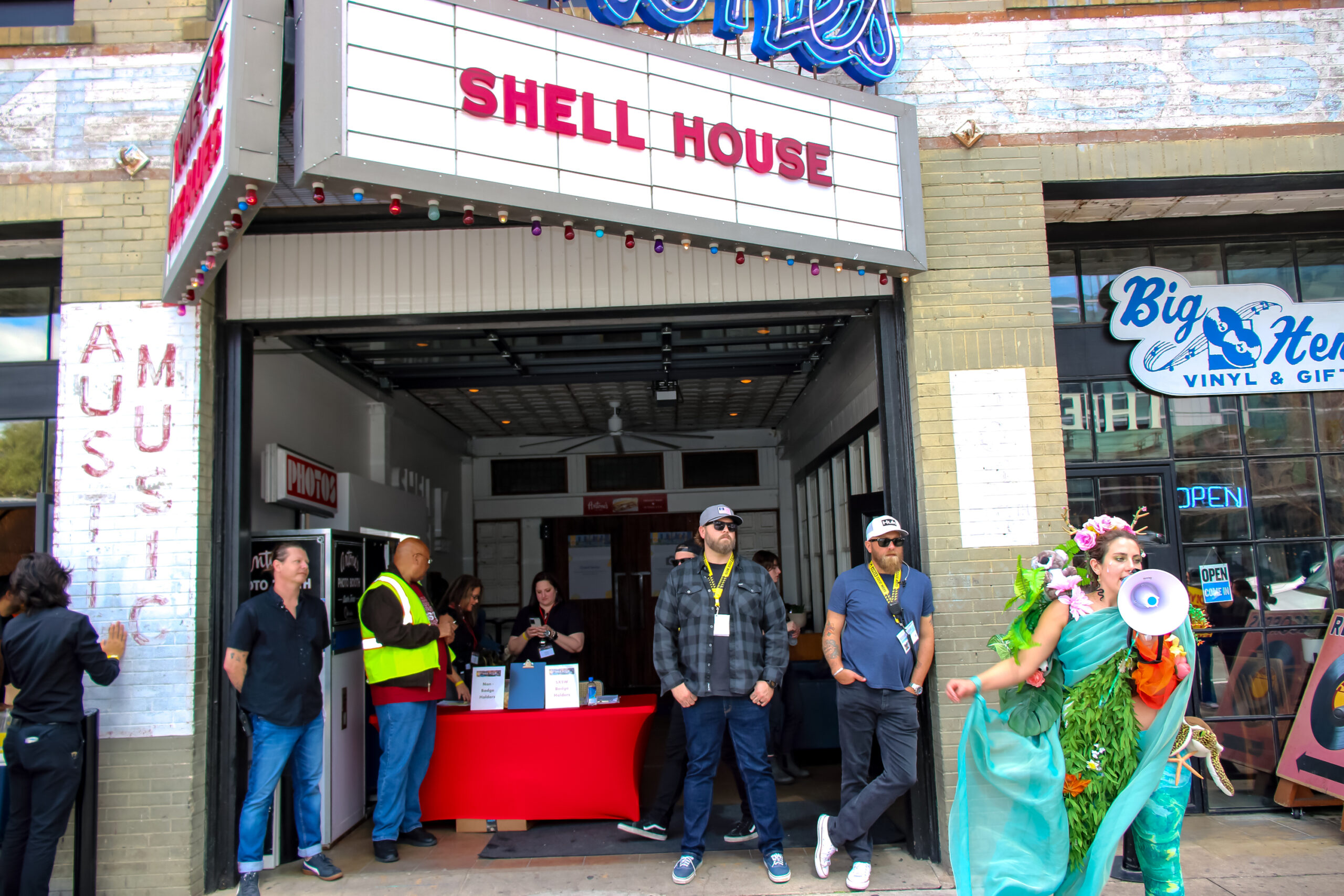
The Shell House presentation itself did emphasize personal responsibility. It offered a way for SXSW attendees to purchase carbon offsets to apparently cancel the emissions that they produced in order to travel to Austin for the festival. Many of the talks focused on how individuals can lower their personal carbon footprint, in addition to advertising Shell’s own net-zero plans.
The company’s stated goal is to reach net-zero emissions by 2050 to help keep global warming below the 1.5-degree threshold laid out in the Paris Climate Accords. On further reading, Shell claims they will reduce the “carbon intensity” of their products 30% by 2030 and 65% by 2050, compared to 2016 emissions. The company’s net-zero page also includes short-term reduction goals of 2-3% in 2021 and 3-4% in 2022, but without any mention of if the 2021 goal was met. A more detailed PDF contradicts the main site, saying that Shell’s goal is only a 20% reduction in “carbon intensity” by 2030. Additionally, a legal disclaimer at the very bottom of Shell’s net-zero page clarifies, “it is important to note that as of April 16, 2020, Shell’s operating plans and budgets do not reflect Shell’s Net-Zero Emissions ambition.”
‘We’re not impressed’
The Texas Director of Public Citizen, Adrian Shelley, told Branch Out, “Shell came to Austin, Texas to present its plan for carbon neutrality by 2050. We know that that’s insufficient. The IPCC Report that just came out told us we have eight years at most to act on climate change and that means a total divestment from fossil fuels as quickly as possible.”
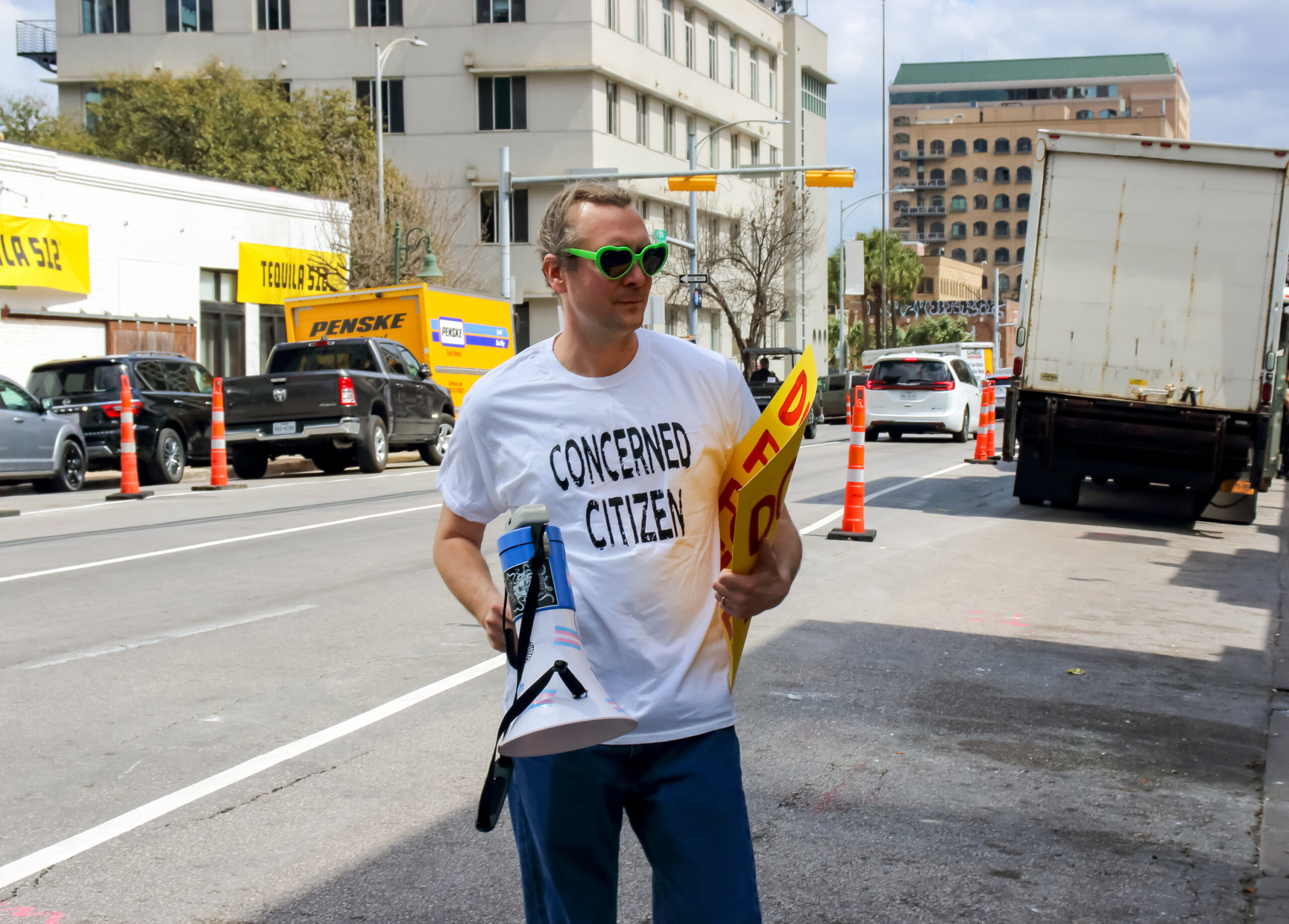
Shelley added that Shell’s presence at SXSW to greenwash their image required a response from local groups: “Events like this ring false to us. So we brought the people out to tell Shell that we’re not impressed. … and more importantly, to tell the people what needs to be done which is urgent action now.”
In addition to doubts about the effectiveness of Shell’s stated plans, there is also skepticism born of familiarity with the company’s history. Shell has known about climate change since the 1980s. In 1991, the company’s own scientists produced a film warning about the dangers of burning greenhouse gasses. Shell did not listen to their own scientists’ warnings and even had plans to expand drilling into the arctic ocean as recently as 2015. Even last year, despite their net-zero commitments, Shell announced plans to increase its gas production 20% in the next few years, claiming that they would use carbon offsets to cancel the environmental impact of the increased emissions.
Strained Dialogue
As the “fireside chat” ended, the group of artists, concerned citizens and activists stood facing anyone exiting the Shell House. On their way out, two Shell employees came and attempted to enter a dialogue with the crowd. Shell Ventures Principal, Andrea Course, came to speak with the Sun and several concerned citizens, telling them to read Shell’s website and see that Shell invests in solar power and hydrogen fuel, adding, “I’m an environmentalist. And you know why I work for Shell? Because that’s the place to make a change.”
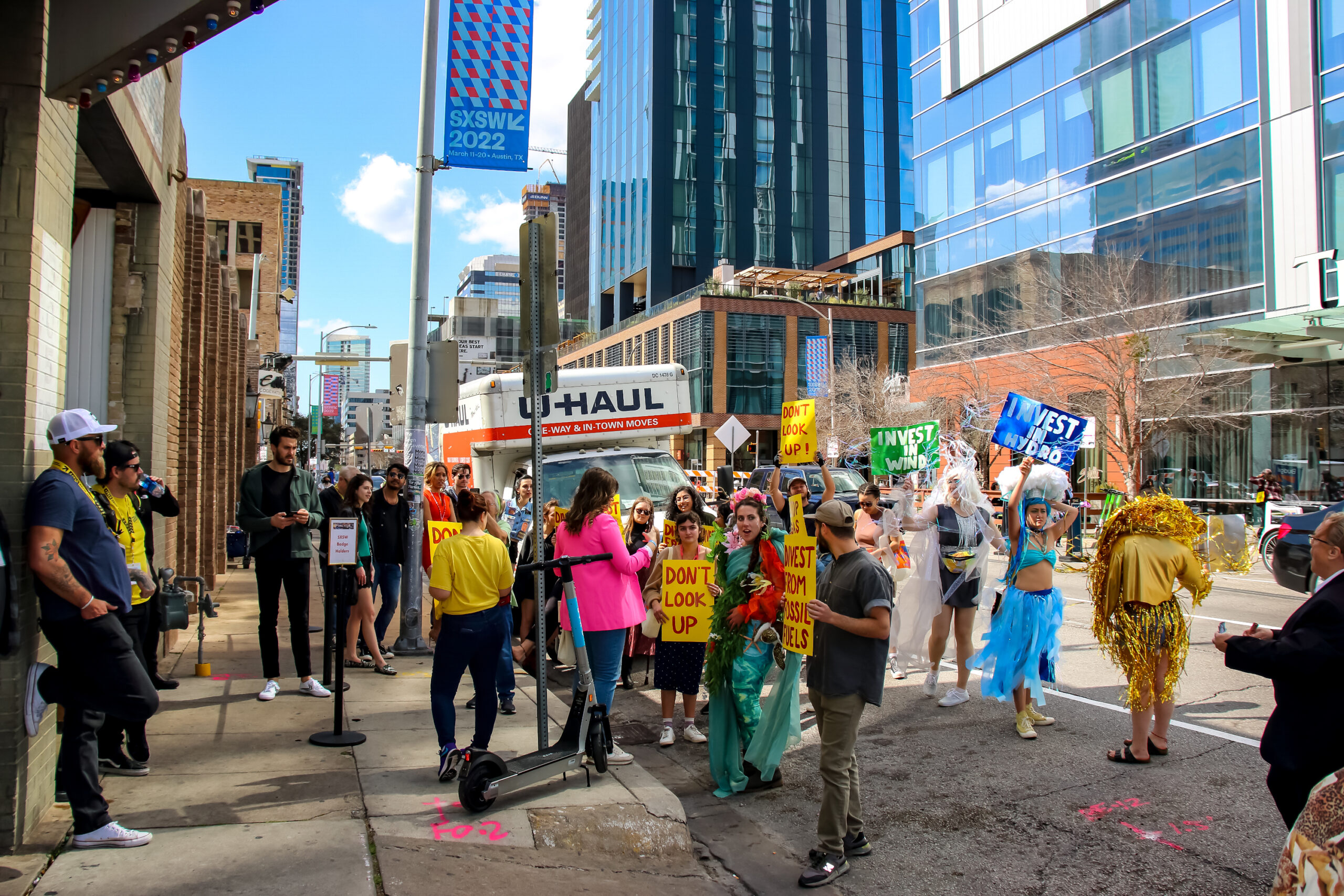
According to a blog on her LinkedIn profile in which she again refers to herself as an environmentalist, Course says she had “zero knowledge of oil and gas” when first joining the industry. The blog goes on to describe her work on “subsea production equipment” with the Houston-based company Schlumberger, which has a division dedicated to designing drilling and pipeline components for off-shore oil wells.
In her discussion with the Sun, Course questioned what good the group was doing by “holding signs,” while also falling back on an individualistic view of how to protect the planet: “I use cloth diapers with my kids. That’s how much I care about the environment.”
Managing Director of Shell Ventures, Geert van de Wouw, also came out to speak with the group. One of the first questions he was asked was how much money Shell spent lobbying governments and politicians for policies that are favorable to the fossil fuel industry, to which he responded bluntly, “We don’t.” When pushed, he doubled down that Shell does not spend money on lobbying. According to Shell’s profile on opensecrets.org, in the United States alone, the company and its subsidiaries spent more than $7 million on lobbying in 2021, and the company employed 41 lobbyists.
A Global Movement
“I don’t think he was actually being genuine, because he deflected from a lot of the questions I was asking,” said Extinction Rebellion member James Talon, who had been part of the dialogue with Geert van de Wouw. Talon told Branch Out why he came to the event: “I’m really scared that we won’t have a planet to live on,” and he urged individuals who share that fear to “organize your workplace, your neighborhood, your community, and your friends and family.”
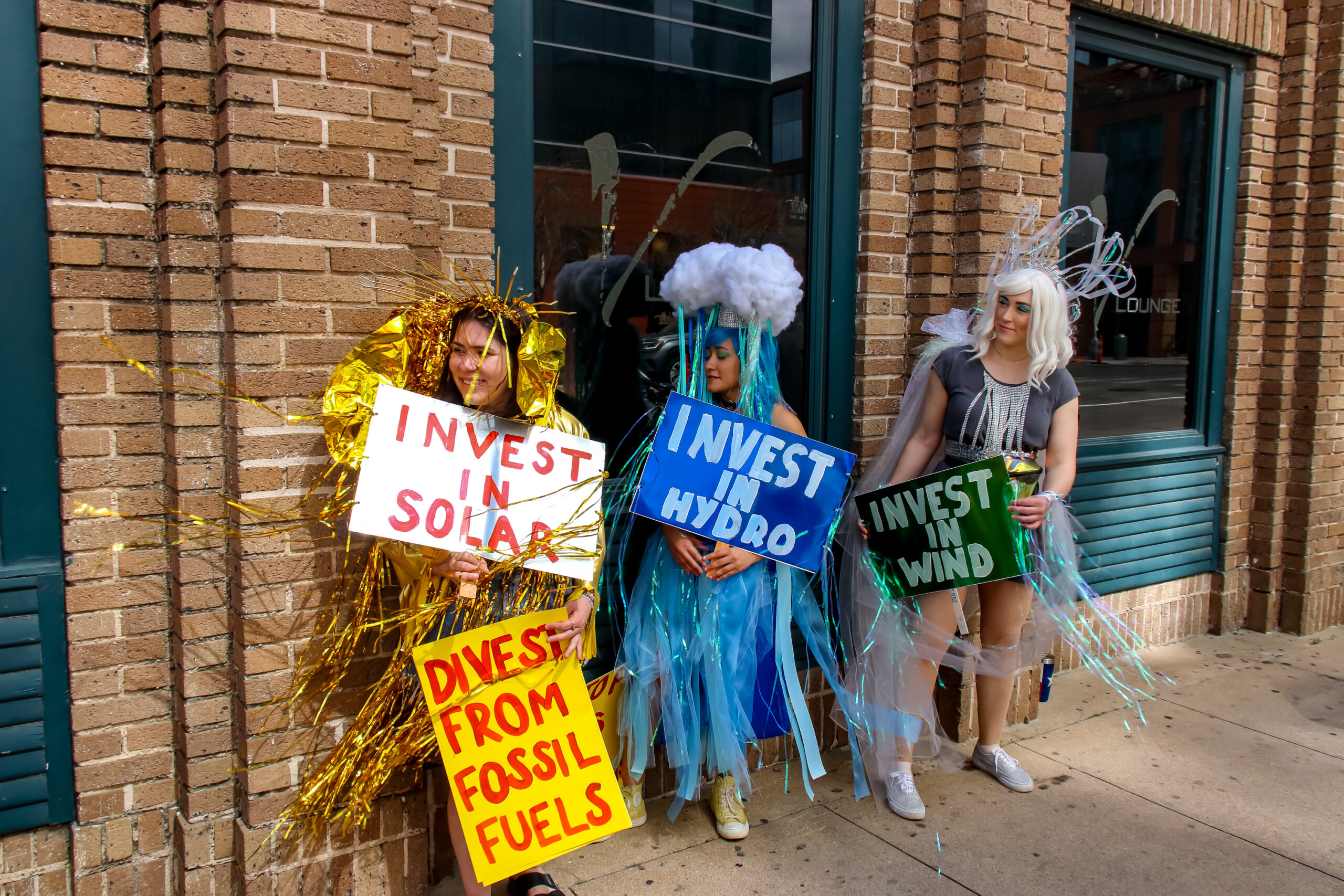
Talon’s Extinction Rebellion comrade, Lindsay Ignatowski, echoed that sentiment by adding, “We want to give people information and resources to think about ways to engage in system-wide change.” Extinction Rebellion is a global environmental movement, founded in 2018 with the demands that governments declare a climate emergency, take immediate action to slash emissions by 2025 and establish a citizen’s assembly to “go beyond politics” and find solutions to the climate crisis. They are hardly the only group to organize in opposition to Shell, which has also been accused of human rights violations in countries around the world such as Myanmar and Nigeria.
Togolese youth climate activist and co-founder of the Act on Sahel movement Kaossara Sani has made strides taking on the fossil fuel giant in her own community and on Twitter with the hashtag #StopShell. Sani has been taking individual action in her own community, leading tree-planting and clean water projects in addition to raising awareness about the climate crisis and global inequities facing African nations.
In February, Sani spoke with FM4 Klimanews about the unequal impact of the climate crisis on the world’s poorer countries: “If you don’t stop your addiction to fossil fuels in rich countries, if you don’t try to find real solutions such as decreasing your emissions – we won’t have solutions.” In a manifesto sent to COP26 last year, Sani also advocated for climate reparations from G20 countries to poorer countries that are seeing the most frontline impacts of the climate crisis.

